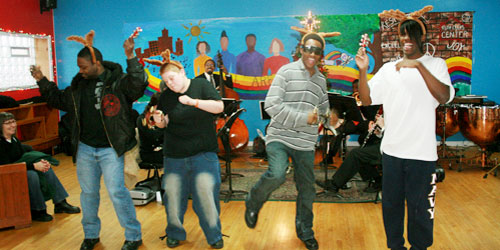
HIGHLAND PARK-
The Ruth Ellis Center has been granted a contract by the Michigan Department of Health and Human Services that will allow LGBT youth to be placed directly with the agency. While long a licensed child caring institution, up until now REC has operated as a non-contracted agency. This meant that an LGBT youth placed in the foster care system had to be rejected by not one, but six contracted agencies before they could be placed at REC.
"A case worker had to fill out – no exaggeration – 80 additional pieces of paperwork to get someone placed at a non-contracted agency," explained REC Executive Director Laura Hughes. "So all these things were stacked against kids who needed to come to the Ruth Ellis Center. Having a contract with the state means that LGBT kids who come into the system have the chance to come to REC on their first instance and be served by providers who are LGBT experts. This is probably the biggest thing to happen to the center since we opened Ruth's House."
The center opened Ruth's House in 2004. The Detroit duplex includes five beds on each side. The contract applies to the half of the house the center calls their intensive treatment units, where minors age 12-17 are placed. The other half operates as a transitional living center for young adults from 18-21.
"You age out of foster care when you hit 18 and you're on your own," said Hughes. "Statistics show that 25 percent of those kids age out directly into being homeless, and another 25 percent are homeless within a year. That's nationally. So if we think about LGBT kids who are underrepresented and least likely to be adopted, this really improves their ability and gives them the opportunity to be in an affirming environment, which means their chances are better later on."
Drop-in center news
In addition to the state contract, other changes are in the works at REC as well. Among them, REC's drop-in center in Highland Park is going to be open one additional day per week.
"We're expanding the hours that we're open," Hughes said. "On Thursdays we're going to have a workshop for lesbian and bisexual girls, and one for transgender youth as well. It really fits with our goal to build an inclusive environment for all LGBT youth. So I think that's really exciting as well."
While the agency, like most non-profits in the state, has faced the burden of reduced grant funding in recent years, diversifying its income streams in innovative ways has allowed them to remain viable.
"We've had substantial changes in 2007 and 2008 as far as our funding sources," said Hughes, who came on board in 2009. "Kevin Howley, our previous interim executive director, created a real sustainable business plan that we've followed to a T. We've worked really, really hard to try to get the stories of our young people out and to really talk about that really within our community. The greatest example of homophobia we face is the fact that people kick their kids – because they're LGBT – out of their homes and think that's OK."
Hughes said that the biggest proof that their message is resonating lies with the outpouring of support the agency has received from the community.
"This past year has been an incredible year of support from the community," she said. "For our annual event, we raised four times what we did last year. That's just incredible. Plus, we've more than doubled the amount that we have brought in from individual donors from last year to this year – and we're not done yet."
Much of the credit, Hughes said, goes to her staff.
"We have a new team that is fresh and innovative," she said. "It's so powerful. So many really, really exciting things are happening. I think we're really getting to see the seeds that we have planted come to fruition."











